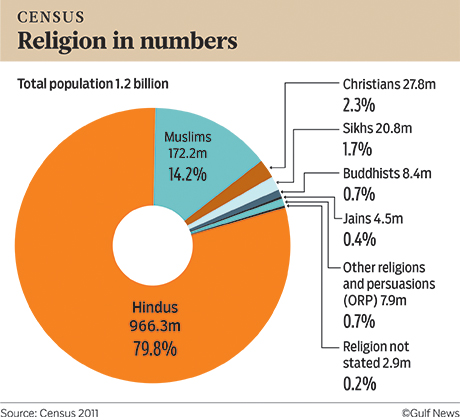Minority Status in India

Copyright infringement is not intended
Context: The Union Ministry of Minority Affairs stated that “state governments can also declare a religious or linguistic community as a ‘minority community’ within the state”.
Details
- In an affidavit filed in the Supreme Court, the Union Ministry of Minority Affairs said “state governments can also declare a religious or linguistic community as a ‘minority community’ within the state”.
- The affidavit was filed in response to a 2020 petition by an advocate, who said that as per the 2011 Census, Hindus were a minority in Lakshadweep, Mizoram, Nagaland, Meghalaya, J&K, Arunachal Pradesh, Manipur, and Punjab and that they should be given minority status in these states in accordance with the principle laid down by the Supreme Court in its 2002 TMA Pai ruling.
- In the TMA Pai case, the SC had said that for the purposes of Article 30 that deals with the rights of minorities to establish and administer educational institutions, religious and linguistic minorities have to be considered state-wise.
Article 30 of Indian Constitution
- Article 30: Right of Minorities to Establish and Administer Educational Institutions.
- Article 30 grants the following rights to minorities, whether religious or linguistic:
- All minorities shall have the right to establish and administer educational institutions of their choice.
- The compensation amount fixed by the State for the compulsory acquisition of any property of a minority educational institution shall not restrict or abrogate the right guaranteed to them.
- In granting aid, the State shall not discriminate against any educational institution managed by a minority.
- The protection under Article 30 is confined only to minorities (religious or linguistic) and does not extend to any section of citizens (as under Article 29).
- However, the term ‘minority’ has not been defined anywhere in the Constitution.
- The right under Article 30 also includes the right of a minority to impart education to its children in its own language.
Minority Communities in India
- The Constitution of India does not define the term minority.
- The distinctiveness of a numerically inferior group is certainly recognised as a legal criterion to determine the minority status of any community.
- As per the Census 2011, the percentage of minorities in the country is about 19.3% of the total population of the country.
- The population of Muslims are 14.2%; Christians 2.3%; Sikhs 1.7%, Buddhists 0.7%, Jain 0.4% and Parsis 0.006%.
- The Union Government notified minority communities at the national level in consultation with various stakeholders under Section 2 (c) of National Commission for Minorities (NCM), Act, 1992.
- The 6 communities notified as minority communities under Section 2(c) of the NCM Act, 1992 are Christians, Sikhs, Muslims, Buddhists, Parsis and Jains.
- Notification of any community specific to a State as a minority community within a State comes under the purview of the State concerned.
- The Article 29 and 30 of the Indian Constitution provide for protection of interest of minorities which includes linguistic minorities also.
- The working definition followed by the Commissioner for linguistic minorities is as follows:-
- Linguistic Minorities are groups or collectivises of individuals residing in the territory of India or any part and having a distinct language or script of their own.
- The language of the minority group need not be one of the twenty two languages mentioned in the Eighth Schedule of the Constitution.
- In other words, linguistic minorities at the State level mean any group or groups of people whose mother tongues are different from the principal language of the State, and at the district and taluka/tehsil levels, different from the principal language of the district or taluka/tehsil concerned.
- The interests of linguistic minorities are accorded due consideration and the office of Commissioner of Linguistic Minorities has been mandated to investigate all matters relating to the safeguards provided for linguistic minorities in the country.
- The Government has Constituted National Commission for Minorities under the National Commission for Minorities (NCM) Act, 1992.
- The NCM receives petitions/grievances from the aggrieved persons and the said petitions/grievances being received by Commission are dealt with by calling for reports from the concerned authorities under the Union and State Governments.
- On receipt of the reports, the Commission makes appropriate recommendations to the respective authorities for Redressal of the grievances.
Way Forward
- The right conferred on minorities under Article 30 is only to ensure equality with the majority and not intended to place the minorities in a more advantageous position vis-a-vis the majority.
- There is no reverse discrimination in favour of minorities. The general laws of the land relating to national interest, national security, social welfare, public order, morality, health, sanitation, taxation etc., applicable to all, will equally apply to minority institutions also.
- The right to establish and administer educational institutions is not absolute. Nor does it include the right to maladminister.
- There can be regulatory measures for ensuring educational character and standards and maintaining academic excellence.



1.png)
